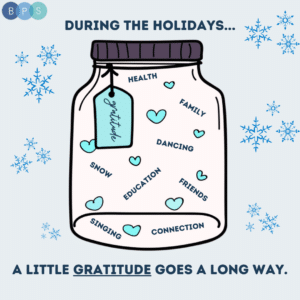Reduce Anxiety with Gratitude this Holiday Season
Have you ever had a thought that you could not get out of your head? Maybe you had one thought that led to hundreds of other thoughts. You might have tried to tell yourself a variation of, “ok, I need to stop thinking about this” which made those thoughts even louder. These ruminating thoughts are a symptom of anxiety. Anxiety can be thought of as the fear of a perceived threat and then underestimating our ability to handle that threat. When we keep on thinking of these worries by either spiraling or trying to suppress them, it can exacerbate our anxiety. Now, if thinking about your worries solves your problems then go for it and don’t let me stop you; however, if ruminating only causes you more suffering then bear with me. Ironically, sometimes when you stop worrying you might have a better shot at solving your problem and reducing anxiety.
So, let’s try to replace our worries with gratitude! Research suggests that our brain cannot hold anxiety and gratitude at the same time. This is because gratitude affects the same area of the brain, the limbic system, that regulates our emotions, so instead of being overwhelmed by anxiety, your limbic system becomes flooded with thankfulness. In doing this, you’re not only preventing rumination, but you’re also lowering your blood pressure, improving your immune system, promoting more efficient sleep, and creating a positive lens through which you see your life, which then makes you feel better.
Below are four, simple and easy ways to integrate gratitude into your day:
1. Mentally give thanks
a. If you don’t have time to write down what you’re grateful for or maybe you just don’t feel like it, mentally giving thanks is a great way to take your brain’s attention away from your worry thoughts. You can utilize this practice when your mind starts to ruminate or as an everyday practice to promote positive thinking.
2. Writing thank you notes
a. Build your self-compassion and relationships by writing thank you notes to your loved ones and/or yourself. There is nothing too small or too big to say thank you for. Simply waking up this morning is something you can thank yourself for. To begin, try writing a thank you note once a month and gradually increasing your frequency.
3. Mindfulness
a. Mindfulness of breath involves intentional focus on the present moment, steering away from past and future moments, while taking a nonjudgmental stance. You can use mindfulness to focus on something you’re grateful for (i.e., Your friends, partner, family, car…etc.). It can be as short as a minute or as long as you’d like. I’d recommend you start off by doing it for a few minutes if you are not used to practicing mindfulness. Your mind will wander and once you are aware of this, remember to bring it back to gratitude.
4. Gratitude Journal
a. Set aside a regular time each day for writing down the things you’re grateful for. This can also be done at night to reflect on things you’re grateful for during the day. Studies have shown that writing one thing you’re grateful for and expanding the list from there enhances gratitude and positive thinking more so than creating a list of unrelated items.
Juneja, J.K. (2022). Gratitude and it’s importance. International Journal of Health Sciences, 6(S2), 9721-9728. https://media.neliti.com/media/publications/430566-gratitude-and-its-importance-b249fae4.pdf
